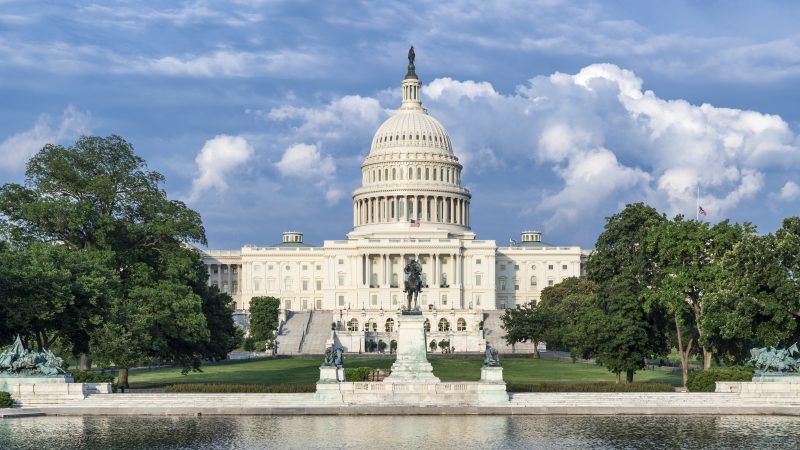Will Senate Republicans Revolt Over Trump's Mexico Tariff Threats?
So far, the answer is "maybe."

If you give 53 Republican senators and their staffers a closed-door forum and also promise them anonymity, a handful might say that tariffs aren't a great idea.
No wonder President Donald Trump doesn't seem too worried about a revolt.
The Washington Post has the details on a closed-door meeting of Republican senators that took place Tuesday afternoon to discuss a response to Trump's threat to hit all Mexican imports with 5 percent tariffs. While the general mood of unhappiness with Trump's brash decision to threaten America's third-largest trading partner with taxes that will be paid by American businesses and consumers is refreshing, the piece isn't exactly a profile in courage.
"During a closed-door lunch, at least a half-dozen senators spoke in opposition to the tariffs, while no one spoke in support, according to multiple people present who spoke on the condition of anonymity to discuss the private meeting," the Post reports. Other media outlets, including CNN and the Associated Press, also ran with the "half-dozen" figure, presenting it as proof of widespread opposition within the GOP.
Perhaps that revolt will materialize. Sen. Kevin Cramer (R–N.D.) told the Post that he believes as many as 20 Republicans would vote to spike the Mexican tariffs if it came to a vote.
From across the ocean, Trump doesn't seem too concerned.
"I think its more than likely that the tariffs go on," Trump said during a press conference on Tuesday in London, where he's on an official state visit. He was talking about the 5 percent tariffs that he's threatened to impose on all goods imported from Mexico starting on June 10. Those tariffs will "gradually increase until the illegal immigration problem is remedied," Trump tweeted on Friday, and the White House later outlined a plan to hike the tariffs from 5 percent to 25 percent by October.
But the president saved his sharpest jab for Congress, the proverbial punching bag of American politics that has so far done nothing to stop the president's tariff-happy trade policies—nevermind the fact that Article I of the U.S. Constitution clearly gives it authority over these matters (though much of that power has been delegated to the president since the 1940s).
"If they do" anything to stop the tariffs on Mexico from happening, Trump warned, "it's foolish."
Certainly no more foolish than the tariffs themselves, which would amount to an $87 billion tax increase on Americans, would disrupt more than $670 billion in annual cross-border trade between the two nations, and would unnecessarily imperil the completion of Trump's much-ballyhooed United States-Mexico-Canada Agreement (USMCA). The tariffs would also be unlikely to accomplish the primary policy aim of stopping Central American migrants from trying to reach the United States, which is what Trump says he wants Mexico to do.
Republicans in Congress rose up in opposition to Trump's executive overreach once already this year. In March, the House and Senate slapped down the White House's declaration of a national emergency on the southern border and the associated $3.6 billion in funding for a few miles of border wall, but Congress was ultimately unable to override the president's inevitable veto. Is it too much to ask that lawmakers find their spines twice in such a short span of time?
In fairness, Senate Majority Leader Mitch McConnell (R–Ky.) was willing to put his name on the record to say "There is not much support in my conference for tariffs." Sen. Rob Portman (R–Ohio) told the Associated Press that "Congress is likely to have a vote" on Trump's Mexico tariffs if they go into effect as planned next week.
On one hand, it's understandable that Congress' response to the tariffs has been muted—at least publicly—so far. Few senators or representatives enjoy openly defying a president from their own party, and Trump has aggressively attacked those who did so.
There's also the hope that Trump will change his mind about the Mexican tariffs without congressional action—Vice President Mike Pence is scheduled to meet with Mexican officials on Wednesday, while Trump is still out of the country. Congress could also be waiting to see whether Trump has the legal authority to impose these tariffs. The law he's invoking, the International Emergency Economic Powers Act, has never been used to impose tariffs and the courts might stop Trump from expanding his powers in that direction. Privately, White House staffers are not convinced Trump has the authority to do this, CNN reported last week.
And there's always the chance that someone in the White House chain of command will simply refuse to carry out his orders, as has happened before.
Such deus ex machina outcomes aside, Congress may be forced to act. If the nation's legislators can get up off the mat, Trump may not like the result.
When the Senate voted against his previous emergency declaration on March 12, the resolution got 59 votes, eight short of being veto-proof. Whether the outcome is different this time will likely depend on GOP senators who supported the president in that earlier showdown but who might go against him this time.
Like Sen. Ron Johnson (R–Wis.), for example. Though he stuck with Trump in March, Johnson told Politico on Tuesday that "This would be a different vote…This would certainly give me great pause."
Again, not exactly a call to man the barricades—but surely better than nothing.


Show Comments (21)